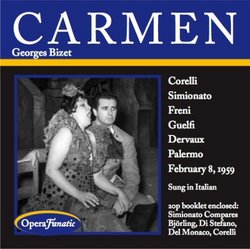| All Artists: Bizet, Corelli, Freni, Guelfi, Simionato Title: Carmen (Complete) (Comp) Members Wishing: 0 Total Copies: 0 Label: BEL CANTO SOCIETY Original Release Date: 1/1/2009 Re-Release Date: 10/13/2009 Album Type: Double CD Genre: Classical Style: Opera & Classical Vocal Number of Discs: 2 SwapaCD Credits: 2 UPC: 789984000120 |
Search - Bizet, Corelli, Freni :: Carmen (Complete) (Comp)
 | Bizet, Corelli, Freni Carmen (Complete) (Comp) Genre: Classical
(1959). Corelli, Simionato, Freni, Guelfi; Dervaux. Sung in Italian. 20-p. booklet with Simionato interview in which she compares Björling, Di Stefano, Del Monaco and Corelli — José was the role of Corelli?s debut... more » |
Larger Image |
CD Details
Synopsis
Product Description
(1959). Corelli, Simionato, Freni, Guelfi; Dervaux. Sung in Italian. 20-p. booklet with Simionato interview in which she compares Björling, Di Stefano, Del Monaco and Corelli
José was the role of Corelli?s debut and the one he performed most often. Here he is in his early prime, sounding like a hungry animal in a cage, the voice brilliant and full of core and bite. Yet he also is plaintive, particularly in the final scene. Throughout it he finds an extraordinary number of vocal colors. His desperation at the end is chilling.
By this time he had expunged nearly all trace of the flicker vibrato characteristic of his tone at the beginning of his career. But his sound still had a baritonal tinge that lessened later, particularly after he undertook high roles, such as Raul in Ugonotti and Poliuto, and lyric ones, such as Rodolfo and Roméo.
Simionato (as often in real life) is haughty, knowing, tough. Freni is young, warm, girlish, her tone unrounded and undarkened, very different from 20 years later, when she changed it to that of a modern soprano. Guelfi swaggers engagingly.
Until fairly recently it was customary to present an opera in the style of the day and of the country in which the performance was given. Accordingly these singers performed Carmen the way they did Cavalleria.
José was the role of Corelli?s debut and the one he performed most often. Here he is in his early prime, sounding like a hungry animal in a cage, the voice brilliant and full of core and bite. Yet he also is plaintive, particularly in the final scene. Throughout it he finds an extraordinary number of vocal colors. His desperation at the end is chilling.
By this time he had expunged nearly all trace of the flicker vibrato characteristic of his tone at the beginning of his career. But his sound still had a baritonal tinge that lessened later, particularly after he undertook high roles, such as Raul in Ugonotti and Poliuto, and lyric ones, such as Rodolfo and Roméo.
Simionato (as often in real life) is haughty, knowing, tough. Freni is young, warm, girlish, her tone unrounded and undarkened, very different from 20 years later, when she changed it to that of a modern soprano. Guelfi swaggers engagingly.
Until fairly recently it was customary to present an opera in the style of the day and of the country in which the performance was given. Accordingly these singers performed Carmen the way they did Cavalleria.

 Track Listings (16) - Disc #1
Track Listings (16) - Disc #1